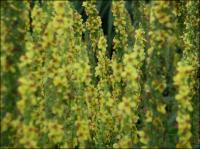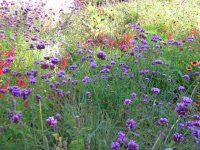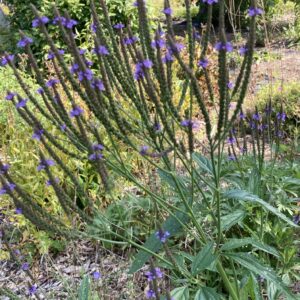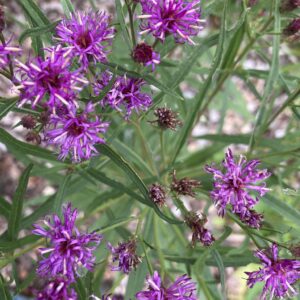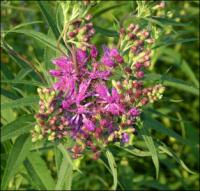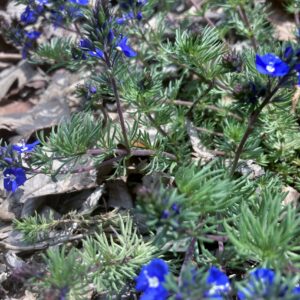Shop
Showing 761–768 of 788 results
-
Verbascum nigrum Dark mullein Self-seeding biennial Z 4-9
June to October (if deadheaded) 3’ fall spikes covered with five-petal flowers of canary yellow, spotlighting purple stamens at each flower’s center.
June to October (if deadheaded) 3’ fall spikes covered with five-petal flowers of canary yellow, spotlighting purple stamens at each flower’s center.
Size: 36" x 24"
Care: Sun well-drained soil - self-seeder
Native: Europe to SiberiaVerbascum was named by the Roman Pliny who said they attracted moths, calling them Moth mulleins. Cultivated in gardens as long ago as Medieval times. Favorite plant in Elizabethan cottage gardens in the 1500’s. Grown in the Eichstätt Garden, the garden of Johann Konrad von Gemmingen, prince bishop of Eichstätt in Bavaria, c. 1600. Described by Parkinson in 1629 as: “a stalke whereon stand many golden flowers with the like purple threads in the middle.”
-
Verbena bonariensis Perennial Z 7-10, colder zones-reseeding annual
Small purple flowers atop tall leafless stems from July to October. Great see-through blooms for growing in back, middle or front of the garden.
Small purple flowers atop tall leafless stems from July to October. Great see-through blooms for growing in back, middle or front of the garden.
Size: 3-4’ x 8”
Care: full sun in moist, well-drained, fertile soil - self-seeder
Native: South America
Awards: Royal Horticultural Society Award of Merit & Missouri Botanic Garden Plant of Merit.Introduced to garden cultivation from its native Buenos Aires in 1726 by the Sherard brothers.
-
Verbena hastata Blue vervain, Simpler’s joy Z 3-9
Bright purplish-blue candelabra-like spikes from July to September
Bright purplish-blue candelabra-like spikes from July to September
Size: 2-4’ x 2’
Care: sun to part shade in moist or moist well-drained soil
Native: eastern 2/3rds of No. America, Wisconsin native
Wildlife Value: Cardinals & Sparrows eat the seeds. Food for larvae of Buckeye butterfly.Native Americans used plant as remedy for coughs, colds, and fever. Mahuna Indians of So. California used the root to cure complicated stomach fevers. Sioux fed the seeds to their horses to give them energy. The Sioux also used it as an insect repellant. Pressed specimen in Emily Dickinson’s herbarium.
-
Vernonia fasciculata Prairie Ironweed Z 3-7
Dense clusters of fluffy petaled, true royal purple flowers atop unbranched stems, July-September
Dense clusters of fluffy petaled, true royal purple flowers atop unbranched stems, July-September
Size: 3-4’ x 2-3’
Care: sun to part shade in moist to moist well drained soil
Native: so central Canada to central & eastern US, Wisconsin native
Wildlife Value: Butterfly attractor – Fiery skipper. Host for Common buckeye butterfly. Deer & rabbit resistant.Lakota Sioux: “The leaves are formed into a sort of “plate” that keeps foreign matter from getting on meat. An infusion of the root is used to regulate menstrual periods.”
Collected by French planthunter André Michaux (1746-1802) who spent 11 years exploring America for plants. Vernonia named to honor Wm. Vernon (1666-1711) English botanist who collected plants in late 1600’s. -
Vernonia lettermannii Threadleaf ironweed Z 4-9
Deep purple inch-wide flower heads top unbranched stems forming a dome in late summer-early fall
Deep purple inch-wide flower heads top unbranched stems forming a dome in late summer-early fall
Size: 4-5’ x 36”
Care: sun in well-drained to moist well-drained soil
Native: Arkansas and OK
Wildlife Value: attracts numerous butterflies and pollen source for bees, deer resistant
Awards: Pennsylvania Horticultural Society Gold Medal 2023Collected on “Cooper’s Creek by Dr. J.M. Bigelow and on the sandbars of the Washita,.” Proc. Amer. Acad. Arts xvi. (1881) 78. 78 1880. “Notes on Some Compositae.” Vernonia named to honor Wm. Vernon (1666-1711) English botanist who collected plants in Maryland in late 1600’s. The species named to honor George Lettermann (1840-1913) who was primarily interested in trees and, while working for the US Census, collected tree specimens in forests of Missouri, Arkansas, western Louisiana and eastern Texas.
-
Vernonia noveboracensis Ironweed Z 4-8
Heads of numerous deep, royal purple, platter-forming flower several feet high above in late summer
Heads of numerous deep, royal purple, platter-forming flower several feet high above in late summer
Size: 6-7' x 3'
Care: Sun in moist to moist well-drained soil
Native: Massachusetts to Florida
Wildlife Value: attracts butterfliesNamed for English botanist William Vernon. Infusions of the plant used by Cherokee to relieve pain after childbirth, for loose teeth and for stomach ulcers.
-
Veronica allionii Alpine speedwell Z 2-9
Purple-blue spikes bloom from early to late summer
ARCHIVED
Note: This is a plant not currently for sale. This is an archive page preserved for informational use.
Purple-blue spikes bloom from early to late summer
Size: 4-6” x 8-12”
Care: sun, moist well-drained to well-drained soil
Native: AlpsDescribed in 1779 in Prosp. Hist. Pl. Dauphiné
-
Veronica armena Armenian speedwell Z 4-9
A peewee plant that packs a punch. In spring to early summer terminal clusters of cup-shaped Vermeer blue flowers made of 4 obovate, smooth-edged petals set off snow white eyes with matching white stamens. Below the floral crown forest-green, soft, needle-sized leaves frame the blue and detail texture for the rest of the season.
A peewee plant that packs a punch. In spring to early summer terminal clusters of cup-shaped Vermeer blue flowers made of 4 obovate, smooth-edged petals set off snow white eyes with matching white stamens. Below the floral crown forest-green, soft, needle-sized leaves frame the blue and detail texture for the rest of the season.
Size: 4” x 6” and spreading
Care: sun in well-drained soil
Native: Armenia, Georgia and TurkeyDiscovered before 1856 when it was named and described by Swiss explorer and botanist Pierre Edmond Boissier.

